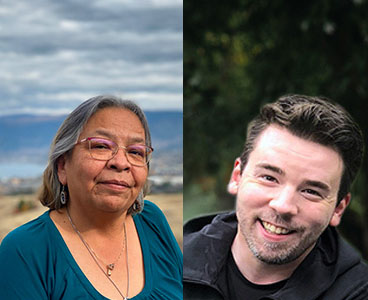
Jacki McPherson, Health Director, Penticton Indian Band, Okanagan Nation has partnered with Dr Mike Bergunder, Emergency Physician and Department Head, Penticton Regional Hospital
Learning events bring providers and patients together
Dr Mike Bergunder, Head of the Penticton Regional Hospital Emergency Department (ED), and Jacki McPherson, Health Director for the Penticton Indian Band (PIB) of the Okanagan Nation, were inspired to take action to improve cultural safety in the ED.
Together, they initiated two collaborative learning events with Interior Health and Snpink’tn (the Penticton Indian Band) to foster greater understanding between health care providers and Indigenous community members.
Funding was provided by Interior Health and the Penticton Medical Staff Association through Facility Engagement, an initiative of the Specialist Services Committee, a joint effort of Doctors of BC and the Government of BC.
Event 1: Listening and learning for health care providers
The first event was a "listening and learning" town hall hosted by the PIB for ED physicians, nurse leaders, medical office assistants, and mental health and substance use care managers.
Held on the PIB reserve, Elders shared a meal along with personal stories about their culture, experiences in residential schools and Indian hospitals, and the lasting impact on their interactions with the health care system today. They discussed why many community members are reluctant to seek care at the ED and are mistrustful of health care providers.
Participants committed to sharing the valuable insights they gained with their teams and programs, using these lessons to improve how they interact with patients seeking care.
Event 2: Emergency Department orientation for Indigenous community members
A second event was an orientation session held at the local community hall, where physicians and health care staff engaged with community members to help them better understand and navigate the ED. The session was well-attended, and community members’ feedback was positive.
Jacki McPherson emphasized the significance of the partners' willingness to collaborate with her people and is optimistic that positive change is finally happening.
Read the full article on Specialist Services Committee website>
"These changes, and working together, have made a big difference for my people. I tell them, ‘We are improving relationships. You will be treated with respect, listened to, you will be heard.’" – Jacki McPherson, Health Director, Penticton Indian Band, Okanagan Nation
“The journey towards cultural safety is a lifelong process, but with the support of Indigenous communities, Interior Health, hospital leadership, and health care workers, there is hope for meaningful and lasting change.” – Dr Mike Bergunder, ED Physician
Accomplishments
- Physicians, providers and the health authority have gained local context on how the experience of residential schools can impact Indigenous patients' experiences when accessing health care, and how they can improve their interactions with that context.
- Development of a brochure for the PIB on when and why to visit the Emergency Room.
- Direct communication between ER physicians and the Indigenous community members.
- Development of IHA committees to continue momentum towards a culturally inclusive space for Indigenous patients.
Lessons learned
- Ensure there are feedback loops and reporting mechanisms in place for next steps, to ensure all working group members are aware of individual responsibilities.
- Review current Joint Collaborative Committee/Doctors of BC supports for Indigenous engagement to streamline resources.
- Prioritize the importance of authenticity and truth, or the relationships will suffer.
- Solutions are not need to be customized around unique environment and historical events that have occurred in a community.
- The need to build relationships continues.
- Achieving cultural safety is a lifelong journey, with many hurdles. The work continues, and progress will be made with everyone doing their best to make things better each day.
Looking for resources to support your own engagement efforts?
Check out the Doctors of BC Guide for Respectful Indigenous Engagement to support divisions, MSAs, and physician members in their work with First Nations, Métis, and Inuit.
![]()
 |
 |
 |
